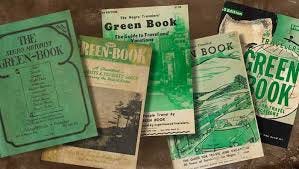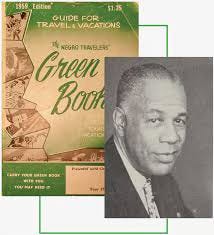The Negro Motorist Green Book (1936–1966) – A Guide to Survival and Joy on the Road
Black History Through the Lens of Liberation
In an era where simply traveling while Black in the United States could be a matter of life or death, The Negro Motorist Green Book was more than just a travel guide—it was a survival tool, a roadmap to safety, and a testament to Black resilience and ingenuity.
Published from 1936 to 1966 by Victor Hugo Green, a Harlem-based postal worker, The Green Book helped Black travelers navigate the dangers of Jim Crow America, providing them with a carefully curated list of businesses—hotels, restaurants, gas stations, and even private homes—where they could safely find rest, food, and shelter without fear of violence or humiliation.
But this story isn’t just about survival. It’s about the ways Black people have always carved out joy, connection, and community in the face of oppression.
The Dangers of Traveling While Black
During segregation, Black Americans faced extreme risks while traveling. Sundown towns—white-only areas where Black people were violently expelled after dark—were scattered across the country, not just in the South but in states like Indiana, Illinois, and Oregon. Police harassment, refusal of service, and the constant threat of racist violence meant that every road trip was a gamble.
The Green Book became an essential resource, not just for those on vacation but for Black musicians, athletes, and businesspeople whose work required them to travel. It helped Black families plan their journeys, ensuring they could avoid dangerous areas and reach safe havens along the way.
Reflection: What does it mean to create safety and community within hostile systems? How does this history inform how we move through the world today?
Black Economic Empowerment Through the Green Book
Beyond safety, The Green Book was a powerful tool of economic resistance. It intentionally directed Black dollars to Black-friendly businesses—many of which were Black-owned—helping them thrive despite the restrictions of segregation.
From restaurants and barbershops to auto repair stations and nightclubs, The Green Book fostered a network of businesses that allowed Black travelers to move with a sense of dignity and security. This economic self-sufficiency was an act of defiance against a system designed to exclude Black Americans from financial prosperity.
Actionable Step: Explore the legacy of Black-owned businesses in your area. What businesses today continue the spirit of economic empowerment and community care?
The Green Book as a Blueprint for Modern Liberation
While The Green Book ceased publication after the Civil Rights Act of 1964 outlawed segregation, the reality of racial discrimination in travel and public spaces did not simply vanish. Black travelers today still face disproportionate police stops, racial profiling in hotels and Airbnbs, and barriers to mobility that echo the past.
Modern versions of The Green Book exist today, including travel guides and digital apps that help Black travelers navigate spaces safely. The spirit of The Green Book lives on in mutual aid networks, online safety guides, and Black travel groups that continue to foster community and connection.
Reflection: What lessons from The Green Book can we apply to creating safe, self-sustaining networks in today’s world?
A 28-Day Journey Through Black Resistance and Liberation
The Green Book is just one example of how Black people have built systems of survival, joy, and resistance within an oppressive landscape. This story, along with many others, is explored in my 28-Day Journey Through Black Resistance and Liberation—a living document that continues to grow with new lessons and resources daily.
Join the journey today: https://desireebstephens.bio/shop/98d6f2f8-2827-4291-b29c-1ceaf77deaac
We have always made a way out of no way. We have always built networks of care and resistance. The Green Book is proof that our survival is not just about struggle—it is about strategy, community, and an unwavering commitment to each other’s safety and well-being.
In solidarity and liberation,
Desireé B. Stephens
Educator | Counselor | Community Builder
Founder, Make Shi(f)t Happen




